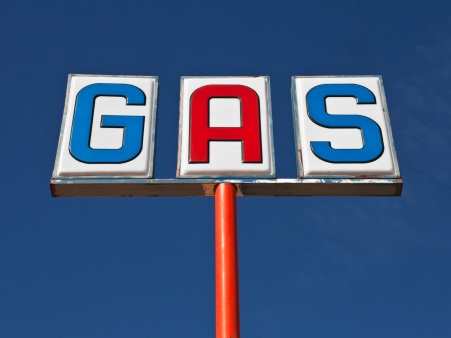
When gasoline prices soared in February of this year, there was plenty of doom and gloom about the direction of U.S. gasoline prices for the rest of 2013. The price jump was the result of the unexpected closing of the Port Reading, N.J., refinery by Hess Corp. (NYSE: HES) and the scrum among traders for adequate supplies. Gasoline prices spiked, followed by a spike in Brent crude. After a few weeks, order was restored and prices for both gasoline and Brent started falling again.
Today’s report on personal income and spending, which we covered earlier, confirms the price drop. Personal consumption expenditures for energy goods and services fell 2.7% in March, after rising 5.8% in February. Compared with March 2012, last month’s drop in energy prices was 1.6%.
There are several reasons for the decline. First, more and cheaper crude oil is getting to the eastern portion of the United States from North Dakota and Canada. Second, U.S. demand is falling as more fuel-efficient cars are being purchased, replacing older less fuel-efficient models. Third, it is not in the best interests of major OPEC producers such as Saudi Arabia, Kuwait and Abu Dhabi for prices to remain high. These countries can afford to have Brent prices fall by half or so from current levels because they can call on their cash reserves until prices stabilize.
Energy economist Philip Verleger offers several reasons why the major OPEC producers could benefit from lower prices. First, demand may pick up in Europe as lower energy prices help consumers in countries caught up in the eurozone austerity programs. Second, as prices fall the privately held supermajors like Exxon Mobil Corp. (NYSE: XOM) and Royal Dutch Shell PLC (NYSE: RDS-A) would have to cut back on their massively expensive exploration and production projects. Third, if the price drops enough, the drive for renewables will stall. Fourth, Russia cannot afford to follow suit. And last, other major exporters like Iran and Iraq will be squeezed.
As Verleger puts it in his most recent weekly newsletter:
Only increases in consumption combined with declines in output or sharp production cuts when use is dropping will stabilize prices. Neither outcome is likely in the near future.
The price differential between Brent and WTI has fallen to around $10 a barrel, and the movement has mostly come from falling Brent prices. That is the effect of a sharp rise in North American supply and falling demand. And there are more declines yet to come.
Travel Cards Are Getting Too Good To Ignore (sponsored)
Credit card companies are pulling out all the stops, with the issuers are offering insane travel rewards and perks.
We’re talking huge sign-up bonuses, points on every purchase, and benefits like lounge access, travel credits, and free hotel nights. For travelers, these rewards can add up to thousands of dollars in flights, upgrades, and luxury experiences every year.
It’s like getting paid to travel — and it’s available to qualified borrowers who know where to look.
We’ve rounded up some of the best travel credit cards on the market. Click here to see the list. Don’t miss these offers — they won’t be this good forever.
Thank you for reading! Have some feedback for us?
Contact the 24/7 Wall St. editorial team.




